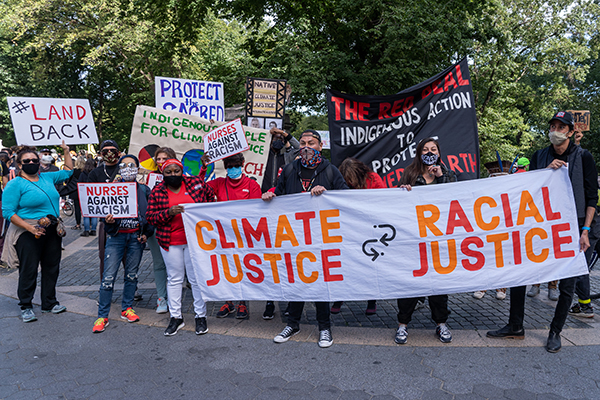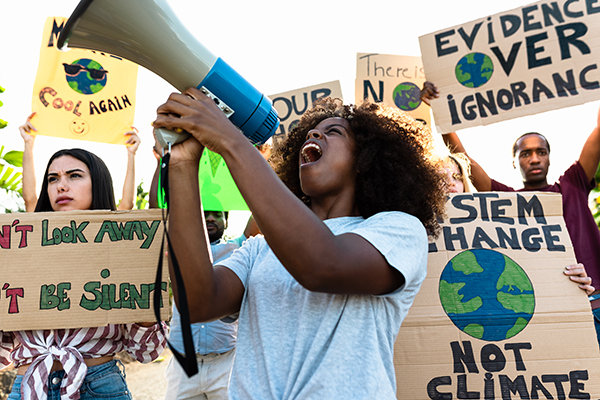In advance of the 26th United Nations Climate Change Conference scheduled to begin Nov. 1 in Glasgow, Scotland, three working groups consisting of 230 authors from 65 countries released the first of four of their reports on climate change on August 9. Their contributions make up the Sixth Assessment Report of the Intergovernmental Panel on Climate Change (IPCC). The report concludes that there is no avoiding ongoing dramatic consequences from the climate change that has already occurred. The report also contains some dire predictions for humanity and the Earth if the world’s governments don’t act immediately to rein in any further human contribution to climate change.
These warnings about the consequences of rising temperatures resulting from burning fossil fuels are not new – they date back to the 19th century. And while millions of people around the world have demanded action, the rich and the powerful continue to put their own profiteering ahead of the interests of humanity.
Sara Omi, an indigenous leader among the Embera people of Panama and president of the Coordinator of Women Territorial Leaders of Mesoamerica, responded to the report by saying “It’s not just about Indigenous communities. It’s about all of humanity.” And Rachel Cleetus, policy director of the Union of Concerned Scientists’ Climate and Energy Program, said “The reality is that this is no longer about future projections. This is about here and now.”
The working groups of experts have produced reports for the IPCC on a seven-year cycle since 1988, having to update with special reports in the interim years because of the rapid changes in climate we are witnessing.
The IPCC report is the only one that studies measurements from land to the ocean to the stratosphere. It not only looks at modeling but also considers human adaptation. One of the reports will focus on our vulnerability to climate change as we experience the degree of geophysical, biological and socio-economic systems collapsing while we struggle to survive from the adverse impacts of climate change.
The IPCC’s much anticipated findings will decide the debate, as if there should be a debate, in November, as world leaders gather in Glasgow. Topics at the conference will focus on reducing emissions, strengthening efforts to combat climate change and mobilizing financial support. Currently, there are 197 signatory countries under the 2015 Paris Agreement agreeing to limit the rise in global temperatures to 1.5 degrees Celcius above pre-industrial levels by cutting fossil fuel emissions by 2050.
Since the IPCC Report is highly respected and accepted by global governments, how will the latest conclusions influence our necessary actions while we are already experiencing increased risk of heat-related mortality, increased risk of deaths from natural disaster injuries, infectious, respiratory and skin diseases, disruption of communities, commerce, transport and societies due to flooding and fires, pressures on urban and rural infrastructures, loss of property, industry and societies, water shortages, generation potentials, and population migration?
After all, reports have been laid on our leaders’ desks since the 1800s, when studies proved human activities were already dramatically increasing the carbon dioxide in the atmosphere.
In 1856, an American scientist named Eunice Foote wrote a brief scientific paper first describing “the extraordinary power of carbon dioxide gas to absorb heat” – the driving force of global warming. In her findings Foote wrote. “Carbon dioxide is an odorless, tasteless, transparent gas that forms when people burn fuels, including coal, oil, gasoline and wood.”
Many other scientists followed her assessment throughout the years warning of high temperatures, melting ice caps, rising sea levels and acidification of ocean waters. A group of scientists warned U.S. President Lyndon Johnson in 1965 about the risk to our climate stating, “Man is unwittingly conducting a vast geophysical experiment. Within a few generations he is burning the fossil fuels that slowly accumulated in the earth over the past 500 million years.”
So why aren’t the majority of our global populations aware of these findings, and in present day media, aware of the IPCC Report?
The oppression of information leaves us with one conclusion: Profits are more important than humans or our human condition. And we all know, the fossil fuel industry is very profitable, not just for the Destructionists that are the CEOs of this industry, but the lobbyists and political leaders who reap from our world’s demise. We need to join together with the millions already fighting to help build this critically important movement, independent of those who seek to profit, to save the Earth and humanity.



